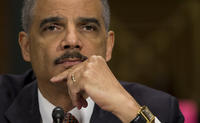-
DEA uses NSA surveillance information to make arrests

The Drug Enforcement Administration (DEA) has benefitted from multiple tips from the National Security Administration’s (NSA) surveillance programs – although not necessarily the programs revealed by Edward Snowden. DEA officials in a secret office known as the Special Operations Division (SOD) are assigned to handle incoming tips from the NSA. The information exchanged between the two agencies includes intelligence intercepts, wiretaps, informants, and a massive database of telephone records.
-
-
NSA director faces tough crowd at Black Hat conference

The National Security Agency (NSA) director General Keith Alexander was met with some applause but mostly skepticism – and even boos — when he spoke during a Black Hat conference in Las Vegas earlier this week. Alexander said that there are only twenty-two people who work at the NSA who can approve the surveillance of a specific phone number, and thirty-five analysts who can review the inquiries.
-
-
NSA revelations raise doubts about passage of cybersecurity legislation
U.S. officials say the revelations about the National Security Agency’s(NSA) domestic surveillance programs could make it harder for lawmakers to pass a cybersecurity bill. Critics of the House cybersecurity bill, known as the Cyber Intelligence Sharing and Protection Act (CISPA), which was passed earlier this year (it is still being debated in the Senate), argued the bill could lead to private information falling into the hands of the NSA.
-
-
Documents show NSA conducted surveillance of EU member states, embassies (updated)

European politicians issued indignant warnings Sunday to the United States that U.S.-European relations may suffer as a result of revelations that the National Security Agency (NSA) spied on European governments and their embassies in Washington, and on European Union (EU) offices. The revelations were contained in documents, dated 2010, which Edward Snowden took from Booz Allen. Observers note that the revelations are not exactly news, since it has always been assumed that the United States spies on the activities of foreign diplomats – even those representing allies — in the United States. It has also been assumed that the United States was conducting surveillance of major countries and international institutions. Moreover, at least seven European Union member states – the United Kingdom, Denmark, the Netherlands, France, Germany, Spain, and Italy — have formal agreements with the United States to provide communications metadata to the NSA. “There’s a certain schadenfreude here [in Europe] that we’re important enough to be spied on,” a senior European official said. “This was bound to come out one day. And I wouldn’t be surprised if some of our member states were not doing the same to the Americans.”
-
-
Documents show NSA conducted surveillance of EU member states, embassies
European politicians issued indignant warnings Sunday to the United States that U.S.-European relations may suffer as a result of revelations that the National Security Agency (NSA) spied on European governments and their embassies in Washington, and on European Union (EU) offices. The revelations were contained in documents, dated 2010, which Edward Snowden took from Booz Allen. Observers note that the revelations are not exactly news, since it has always been assumed that the United States spies on the activities of foreign diplomats – even those representing allies — in the United States. It has also been assumed that the United States was conducting surveillance of major countries and international institutions. Moreover, at least seven European Union member states – the United Kingdom, Denmark, the Netherlands, France, Germany, Spain, and Italy — have formal agreements with the United States to provide communications metadata to the NSA. “There’s a certain schadenfreude here [in Europe] that we’re important enough to be spied on,” a senior European official said. “This was bound to come out one day. And I wouldn’t be surprised if some of our member states were not doing the same to the Americans.”
-
-
Background check of Snowden may have been faulty
The Inspector General of the Office of Personnel Management (OPM) told lawmakers that a 2011 security reinvestigation of Edward Snowden’s background, conducted by a government contractor, may have been faulty. Later in 2011, OPM began investigating the contractor — USIS — for contract fraud. That investigation is still ongoing. The IG told the lawmakers that eighteen background investigators and record searchers — eleven federal employees and seven contractors — have so far been convicted for falsifying background investigation reports. Their abuses included interviews that never occurred, answers to questions that were never asked, and record checks that were never conducted, the IG said.
-
-
NSA director: surveillance programs prevented “dozens” of terror attacks
Gen. Keith Alexander, the director of the National Security Agency (NSA) and commander of the U.S. Cyber Command, told lawmakers yesterday (Wednesday) that the NSA’s electronic surveillance programs have been indispensable in thwarting “dozens” of terrorist attacks on targets in the United States and abroad. He told the senators that securing a “cyber arena” could be done without infringing upon the privacy rights of Americans. “We do not see a tradeoff between security and liberty,” Alexander said, later adding, “We are trying to protect Americans.”
-
-
ACLU files lawsuit challenging NSA's phone surveillance
In the wake of the past week’s revelations about the NSA’s surveillance of phone calls, the yesterday American Civil Liberties Union (ACLU) filed a lawsuit charging that the program violates Americans’ constitutional rights of free speech, association, and privacy.
-
-
U.S. secretly obtains AP phone records to identify source of story

In what the AP calls a “massive and unprecedented intrusion” into the news organization’s news work, the U.S. Justice Department secretly gathered two-months-worth of telephone records of the agency’s reporters and editors. The AP says the records listed incoming and outgoing calls to the offices and homes of reporters and editors. The Justice Department began collecting the phone records in order to identify the source or sources of a 7 May 2012 AP story which detailed a secret CIA operation in Yemen to intercept an al Qaeda-sponsored attempt to load an IED onto a U.S.-bound airplane.
-
-
U.S. considering revamping wiretap laws
The White House is reviewing an FBI plan to overhaul surveillance laws in order to make it easier for law enforcement officials to wiretap citizens using the Internet to communicate rather than phone services.
-
-
McCaul to draft cybersecurity bill
House Homeland Security chairman Michael McCaul (R-Texas) said he was drafting his own cybersecurity bill, which will define the role of DHS in sharing information with private companies about cyber threats. McCaul hopes to agree on a compromise with the White House, which threatened to veto the bill.
-
-
Sponsors of CISPA to address nagging privacy concerns about the bill
House Intelligence Committee chairman Mike Rogers (R-Michigan) and Ranking Member Dutch Ruppersberger (D-Maryland), sponsors of the Cyber Information Sharing and Protection Act (CISPA), say they are currently working on the draft to alleviate privacy concerns civil liberty advocates may have about the bill.
-
-
Justice Department agrees 1986 snooping law should be reviewed
The U.S. Justice Department said earlier this week that it supports reviewing legislation which allows U.S. law enforcement officials to read someone’s e-mails without a search warrant. The 1986 Electronic Communications Privacy Act (ECPA) states that federal authorities only need a subpoena issued by a federal prosecutor, not a judge, to search through a person’s e-mails which are older than 180 days or which have already been opened.
-
-
Facebook’s Likes expose intimate details, personality traits of millions
Research shows that intimate personal attributes can be predicted with high levels of accuracy from “traces” left by seemingly innocuous digital behavior, in this case Facebook Likes. Study raises important questions about personalized marketing and online privacy.
-
-
iPhones can reveal a lot about their owners to law enforcement
People assume their iPhones are safe to keep their personal information on. They would be dismayed to realize what law enforcement agencies can find about them on their phone.
-
- All
- Regional
- Water
- Biometrics
- Borders/Immig
- Business
- Cybersecurity
- Detection
- Disasters
- Government
- Infrastructure
- International
- Public health
- Public Safety
- Communication interoperabillity
- Emergency services
- Emergency medical services
- Fire
- First response
- IEDs
- Law Enforcement
- Law Enforcement Technology
- Military technology
- Nonlethal weapons
- Nuclear weapons
- Personal protection equipment
- Police
- Notification /alert systems
- Situational awareness
- Weapons systems
- Sci-Tech
- Sector Reports
- Surveillance
- Transportation
Advertising & Marketing: advertise@newswirepubs.com
Editorial: editor@newswirepubs.com
General: info@newswirepubs.com
2010-2011 © News Wire Publications, LLC News Wire Publications, LLC
220 Old Country Road | Suite 200 | Mineola | New York | 11501
Permissions and Policies
Editorial: editor@newswirepubs.com
General: info@newswirepubs.com
2010-2011 © News Wire Publications, LLC News Wire Publications, LLC
220 Old Country Road | Suite 200 | Mineola | New York | 11501
Permissions and Policies
